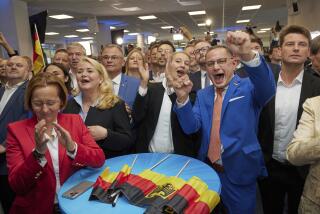Millions of Italians Vote at End of Bitter Campaigns : Europe: Personalities and parties overshadow the issues. Balloting will continue today.
- Share via
ROME — Under sparkling Palm Sunday skies, the vanguard of 48 million Italian voters meandered leisurely to the polls for national elections expected to recast their troubled nation’s political future.
Voting to renew a bicameral national legislature resumes this morning and continues until 10 p.m. Exit polls should be available around noon Pacific time, but Interior Ministry officials do not expect authoritative returns before Tuesday.
Issues weighed less in the campaign than stark left, center and right divisions carved around personalities and their political parties.
In all three camps, there is broad agreement that Italy should remain an integral part of the North Atlantic Treaty Organization and the European Union, that its economy should remain free market with a strong social awareness, that major government-controlled industries should be privatized and that a national government saddled with huge public debts should be made more efficient.
Such general consensus was obscured, however, by campaign vitriol with Cold War echoes. With many voters undecided until the last minute and no polls published in the last two weeks of the campaign, the outcome was anybody’s guess.
For the first time, voters chose candidates rather than parties in winner-take-all voting for three-quarters of the 630 seats in the lower house and 315 seats in the Senate.
“These elections are without doubt a decisive moment in the history of our country,” President Oscar Luigi Scalfaro said after voting. Alarmed by the volume and tone of campaign venom, he had called for candidates to tone down their rhetoric.
Most analysts predicted a tight finish between a three-party right-wing alliance headed by political newcomer Silvio Berlusconi, one of Italy’s richest men, and an eight-party leftist alliance centered on the former Italian Communist Party led by Achille Occhetto.
Berlusconi, a self-made Milan billionaire, ran on an anti-communism platform and the promises of more jobs and lower taxes. “Oppressor,” he snarled at Occhetto in a vituperative televised debate.
Occhetto, who transformed what was once the largest Communist Party in the West into the social democratic Party of the Democratic Left, ran on conservative economics and experience--his party has administered virtually every major Italian city in recent years. “Demagogue,” Occhetto snapped at Berlusconi.
By all accounts, the elections will strip authority from the political center, embodied by the former Christian Democrats who dominated all 52 Italian governments since World War II. Decimated and splintered by a corruption scandal that has tarred thousands of politicians and businessmen, the best the Christian Democrats could hope for this time is a junior partnership in a new coalition government dominated by newcomers of either the left or right.
The elections were extended to a second day to allow members of Italy’s small Jewish community observing Passover to vote after sundown today. Fewer than half of the 519 voters registered at Precinct 2397 in the heart of Rome’s old Jewish ghetto voted Sunday.
“Because of where we are and who we are, we expect the big rush tomorrow after the sun goes down,” said Giancarlo Ministieri, poll-watcher for the leftist alliance at a middle school turned polling station in the ghetto.
Compared to the venomous campaign, Election Day itself was quiet--a street festival for many Romans.
No major incidents were reported in a country where electoral high jinks are not unknown. In the past, the dead have been known to vote in southern areas of the country where organized crime plays a major political role.
On Sunday, by contrast, Calabrians could vote for the dead. Domenico Longo, a neo-fascist candidate in the town of Cosenza, died after the ballots were printed, but judges said votes for him would count.
More to Read
Sign up for Essential California
The most important California stories and recommendations in your inbox every morning.
You may occasionally receive promotional content from the Los Angeles Times.













